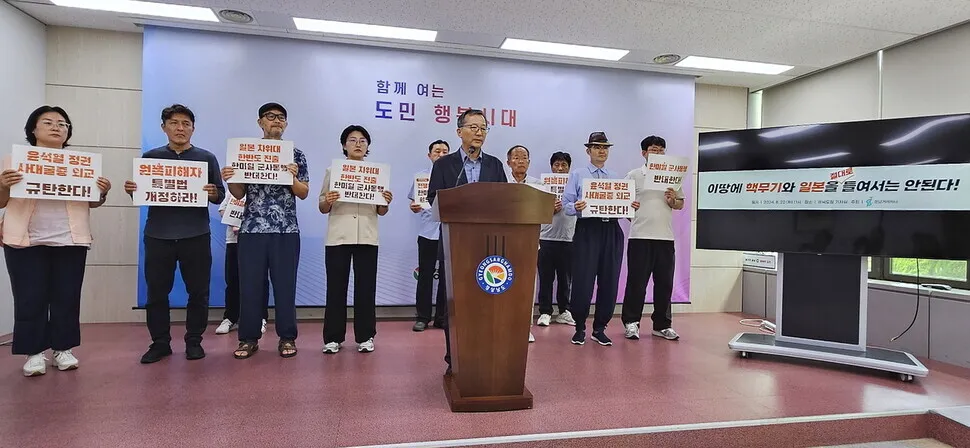hankyoreh
Links to other country sites 다른 나라 사이트 링크
Korean A-bomb victims and their families protest joint war drills with the US

Groups of Korean victims of the atomic bombs dropped on Japan are protesting Ulchi Freedom Shield, joint military exercises that South Korea and the US are holding on Aug. 19-29. The groups are concerned that the exercises could raise tensions on the Korean Peninsula and provide an excuse for waging nuclear war.
The South Gyeongsang Province chapter of the group Movement for One Korea held a press conference titled “We must not allow nuclear weapons or Japan onto this land” at the press center of the South Gyeongsang Provincial Office on Tuesday. Atomic bomb survivors also attended the press conference, joining the calls to halt Ulchi Freedom Shield.
“The Japanese and American governments need to make a bigger effort to apologize and compensate the victims of the atomic bomb and find a way to get along,” said Lee Tae-jae, the chairperson of the Korean Association of Atomic Bomb Victim Descendants.
“The Korean government also needs to revise the Special Act on Support for Korean Atomic Bomb Victims to provide comfort and assistance to the descendants of atomic bomb victims who suffer from heritable conditions resulting from their parents’ radiation exposure. But there are many people in Korea who don’t even know there are atomic bomb survivors in the country. I resent the Korean government for its apathy on this issue,” the chairperson went on.
Also at the protest was Lee Nam-jae, the director of the Hapcheon Peace House, a support center for atomic bomb survivors.
“The continuing impact of radiation exposure is currently being seen in the great-grandchildren of the original survivors. That impact is inherited through genetic mutations. The descendants exhibit a high infant mortality rate and high incidence of mental disorders, skin disorders and cancer,” Lee said.
“We need to ensure that nuclear war never occurs again on our planet. We can’t allow anyone else to suffer what we have because of nuclear war.”
“My father lost vision in both eyes after he was exposed to the atomic bomb blast in Hiroshima. My older brother, who was born about a decade later, had a congenital abnormality that prevented him from seeing straight,” said Mun Jong-ju, a member of a group for ailing second-generation atomic bomb survivors in Korea.
“My little sister and I have also been suffering from various medical conditions since a young age. I’m determined to receive an apology from the Japanese and American governments for wrecking our family. It baffles me why our government is instead intent on bringing the American and Japanese armies into our country,” Mun said.
When atomic bombs were dropped on the Japanese cities of Hiroshima, on Aug. 6, 1945, and Nagasaki, on Aug. 9, a total of 280,000 people were exposed to nuclear radiation. That included some 70,000 Koreans, of whom 40,000 lost their lives. Among the 30,000 survivors, around 23,000 returned to Korea after its liberation from Japanese rule. But these survivors continued to suffer from a variety of related physical ailments.
When the atomic bomb survivors went on to have children after liberation, those children often suffered from hereditary conditions resulting from their parents’ radiation exposure, despite not having been directly exposed to the atomic blasts. But the Special Act on Support for Korean Atomic Bomb Victims only recognizes direct atomic bomb survivors as being eligible for government assistance on the grounds that the impact of radiation exposure has not been proven to be a heritable condition.
By Choi Sang-won, South Gyeongsang correspondent
Please direct questions or comments to [english@hani.co.kr]

Editorial・opinion
![[Column] Korea’s young men need liberating too [Column] Korea’s young men need liberating too](https://flexible.img.hani.co.kr/flexible/normal/331/199/imgdb/original/2025/1109/4617626490179221.jpg) [Column] Korea’s young men need liberating too
[Column] Korea’s young men need liberating too![[Correspondent’s column] Yet another fragmented Sado mine memorial [Correspondent’s column] Yet another fragmented Sado mine memorial](https://flexible.img.hani.co.kr/flexible/normal/500/300/imgdb/original/2025/1107/2517625049628864.jpg) [Correspondent’s column] Yet another fragmented Sado mine memorial
[Correspondent’s column] Yet another fragmented Sado mine memorial- [Column] Why is South Korea clamoring for yesterday’s nuclear submarines?
- [Column] The banality of Korea’s ‘democratic fascism’
- [Editorial] New York City elects a potent foil to Trump
- [Column] Nuclear submarines and the paradoxes of pursuing denuclearization
- [Editorial] Korea must find a new equilibrium between US and China
- [Column] Trump’s protection racket
- [Editorial] Devil will be in the details of Korea-US trade deal
- [Editorial] Lee must stick to guiding principles in tariff negotiations
Most viewed articles
- 1[Column] Korea’s young men need liberating too
- 2Newly discovered letters show Japanese diplomat played part in assassination of Queen Min
- 3Don’t hold your breath for China to lift restrictions on Korean cultural content
- 4[News analysis] How KIKO derivatives devasted S. Korean small and medium-sized exporters
- 5[Editorial] Opposing Da Vinci Code and Freedom of Expression
- 6Real-life heroes of “A Taxi Driver” pass away without having reunited
- 7Koreans are getting taller, but half of Korean men are now considered obese
- 8Architect of denuclearization policy says it’s time South Korea pursues nuclear latency
- 9Week after US-Korea summit, lack of tariff deal fact sheet raises doubts
- 10[Editorial] New York City elects a potent foil to Trump